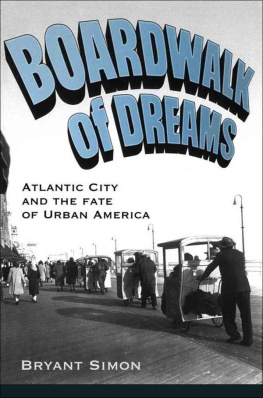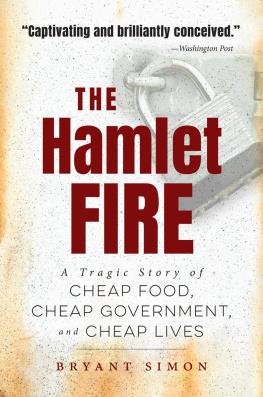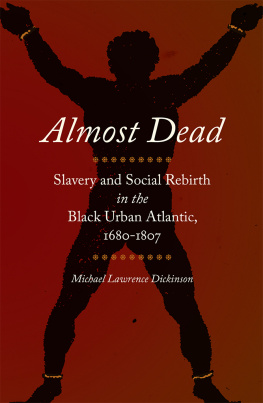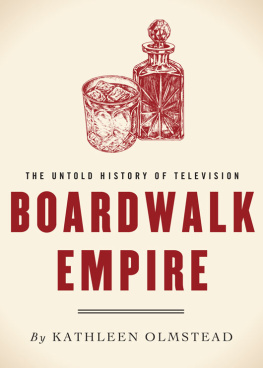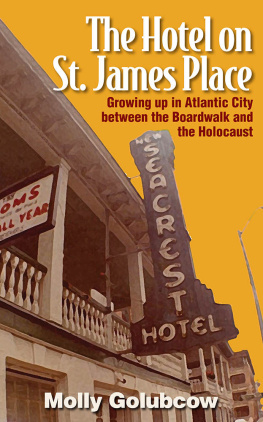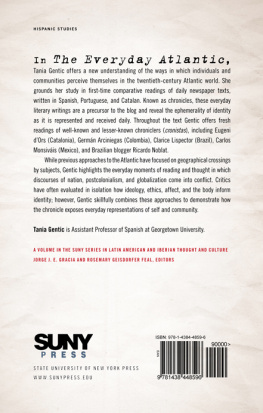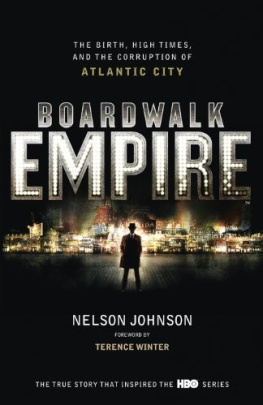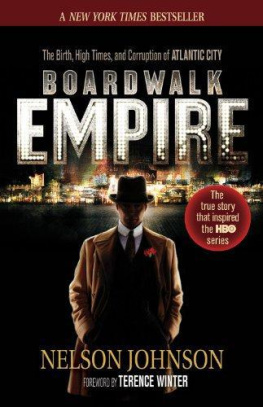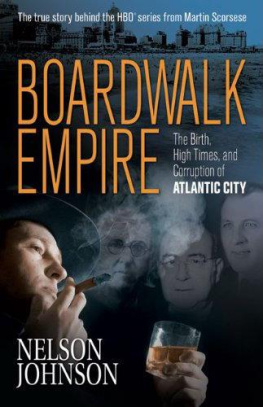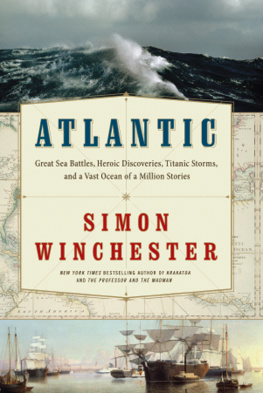BOARDWALK of DREAMS
BOARDWALK of DREAMS
ATLANTIC CITY AND THE FATE OF URBAN AMERICA
BRYANT SIMON


Oxford New York
Auckland Bangkok Buenos Aires Cape Town Chennai
Dar es Salaam Delhi Hong Kong Istanbul Karachi Kolkata
Kuala Lumpur Madrid Melbourne Mexico City Mumbai Nairobi
Sao Paulo Shanghai Taipei Tokyo Toronto
Copyright 2004 by Oxford University Press, Inc.
Published by Oxford University Press, Inc.
198 Madison Avenue, New York, New York 10016
www.oup.com
Oxford is a registered trademark of Oxford University Press
All rights reserved. No part of this publication may be reproduced,
stored in a retrieval system, or transmitted, in any form or by any means,
electronic, mechanical, photocopying, recording, or otherwise,
without the prior permission of Oxford University Press.
Library of Congress Cataloging-in-Publication Data
Simon, Bryant.
Boardwalk of dreams : Atlantic City and the fate of urban America / Bryant Simon.
p. cm.
Includes bibliographical references and index.
ISBN 0-19-516753-8
1. Atlantic City (N.J.)History. 2. Atlantic City (N.J.)Social conditions.
3. City and town lifeNew JerseyAtlantic CityHistory.
4. Middle classNew JerseyAtlantic CityHistory.
5. Atlantic City (N.J.)Biography. 6. Simon, Bryant. I. Title.
F144.A8S57 2004
974.985dc22 2004041479
Independence Day by Bruce Springsteen. Copyright 1980 Bruce Springsteen. All rights reserved. Reprinted by permission.
Atlantic City by Bruce Springsteen. Copyright 1982 Bruce Springsteen. All rights reserved. Reprinted by permission.
Parts of the book have appeared in different form in the following articles:
Reprinted from Beyond the Ruins: The Meanings of Deindustrialization, edited by Jefferson Cowie
and Joseph Heathcott. Copyright 2003 by Cornell University. Used by permission of the publisher,
Cornell University Press.
Bryant Simon, New York Avenue: The Life and Death of Gay Spaces in Atlantic City, New Jersey, 1920-1990,
Journal of Urban History 28, no. 3 (March 2002): 300-327, copyright 2002 by Bryant Simon,
Reprinted by permission of Sage Publications, Inc.
1 3 5 7 9 8 6 4 2
Printed in the United States of America
on acid-free paper
For Annie, Benjamin, and Eli
PREFACE
I didnt grow up in Atlantic City. Born in Pittsburgh, I went to school in Vineland, a city of 50,000 people in the middle of the sandy flatlands of South Jersey with diagonal parking downtown for local farmers trucks. My family didnt spend their summers in Atlantic City either. But we did occasionally make the thirty-five-mile drive to the shore. When I was twelve, my parents took me to Gordon Alleys in downtown Atlantic City to buy my charcoal-gray Pierre Cardin bar mitzvah suit. In junior high, I went to the Boardwalk a couple of times and rode on rickety bumper cars and ate slices of greasy pizza. After the gambling referendum passed in 1976, my high school math teacher demonstrated the principles of permutations to my class by showing us how to determine the odds at the craps tables. But mostly I stayed away from Atlantic City. Everyone said it was dangerous; the Boardwalk wasnt as busy as Wildwood or Ocean City, and I couldnt get into the casinos to put my newfound knowledge of dice to use, so why go, I thought.
After I went to college, Atlantic City started to become more of a focal point in my life. Several high school friends went to work in the casinos, while I started to spend my summers working in Cape May. Sometimes when the bars closed there, we would drive up the New Jersey Parkway to Atlantic City to listen to casino lounge acts. When the Trieners or Sam Butera played, we went up earlier in the night and stayed longer. My parents took me to see Sammy Davis, Jr., and Willie Nelson in the bigger casinos show rooms, and every once in a while we headed to a casino buffet to stuff ourselves on Alaskan king crab legs and prime rib.
Then two things happened that brought Atlantic City closer to the center of my life. My family moved its businessJust Four Wheels, a car and truck rental centerto Absecon, a small town outside of Atlantic City. Whenever I stopped by the store, as we called it, my father and brother would send me to pick up customers at the casinos or drop them off at nearby houses and apartments. Late one night during my freshman year of college, my father took me to repossess a car in one of the citys more depleted neighborhoods. Then, in the mid-1980s, my family bought a duplex four blocks from the beach in Ventnor, a shore town just south of Atlantic City.
About then, I also quit smoking, a habit I had picked up working in Cape May restaurants. Trying to clear my lungs, I got up early each morning to ride my bike on the Boardwalk. In many ways, this study of Atlantic City started on those bike rides.
My brother would always say to me, as we headed north from Ventnor to Atlantic City, Look at the ocean, isnt it great? Yes, I would say, but it was the buildings, the Convention Hall, the outlines of the Warner Theater, and Garden and Central piersthe remnants of the pastthat caught my eye. But I was watching the present as well. I always slowed down when I saw Celestine Tate Harrington in front of Ballys Park Place Casino. Unable to move her arms or legs, Harrington lay on a gurney and played Amazing Grace on an electric organ with the tip of her tongue. I stared at those guys I saw many mornings on the Boardwalk, their suit jackets wrinkled and their hair matted and sandy, screaming into pay phones, Yeah, thats right. I lost everything, everything! Now come and fucking get me... please.
Farther north on the Boardwalk, past the last casino, was another scene that captivated me. Growing up in South Jersey, I had always wanted a house right on the beach, and there, beyond the hotels and piers, was a huge chunk of abandoned beachfront property and beyond that block after block with more holes than houses. Years later, I would learn that this was Paulines Prairie, an urban renewal site that took its name from the former head of the local housing authority. But on those first rides down the Boardwalk, I just couldnt believe my eyes. How could there be empty spaces right on the beach? How did a city with a convention hall as big as several city blocks end up with a hole as big as ten city blocks? I dont know why these questions fascinated me so much, but they were what got me started asking about Atlantic City.
People told me about the hole and about urban renewal, but they also told me about dressing up in spit-shined loafers and flowered bonnets to go to palace-sized movie theaters. I heard about Jewish numbers runners and about mob hits. I learned about the amusement piers with roller coasters and diving horses and about Louis Armstrong and Louis Prima, the Beatles and Frank Sinatra performing around town.
After my family bought the Ventnor duplex, I took a summer job making sandwiches at Lous, a vast subterranean deli near the Ventnor-Atlantic City dividing line. Between filling orders for grilled knockwurst and corned beef sandwiches, I heard more Atlantic City stories. The older white people who came into the restaurant got dreamy when they talked about Atlantic City. All of their stories ended with lines like, You should have seen it back then. Over and over again, I heard about how much fun the Boardwalk was, how classy everything was, how dressed up everybody was, how beautiful and melodious the big bands and singers sounded, and how there was no crime back then, not like now. Not like nowthat was another common refrain. These people made Atlantic City seem like Disneyland, even better really. Atlantic City sounded to me like a scene from one of those great Frank Sinatra songs: lush, smoky, urbane, cool, and fun. Sometimes I wished I could have spent one night in this now-lost world.
Next page
